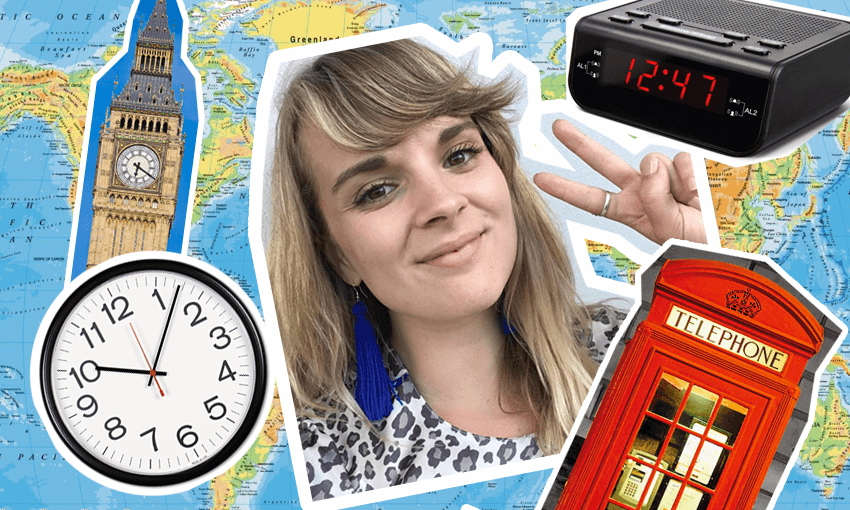In her fourth Elleswhere column about life as an expat New Zealander in London, Elle Hunt navigates the lost connections of a 12 hour time difference.
I wake up and check my phone. My lock screen is a list of notifications. While I’ve been sleeping, friends on the other side of the world have messaged me on multiple platforms, the alerts piling up overnight.
“That will stop soon enough,” says my flatmate grimly.
Alan and I had met in Sydney, where we had both moved for work. After a year he’d gone home to London and I’d stayed on. For the 18 months in which we were on different sides of the planet, our communication had been sporadic and stilted.
We had most often crossed paths online on Saturday afternoons, when he was heading home from a night out and I was relaxing ahead of mine. Our WhatsApp thread was a back-and-forth of mixed messages – Alan’s struggle to find his Uber versus my sedate chores, his late-night snack selfie followed by mine of my clay face mask.
With the 12-hour time difference effectively serving as a language barrier, there was no chance of falling into any kind of conversational step. It wasn’t until I moved to London that we really caught up with each other’s lives, even though technology had technically made it possible in the interim.
Now we live and work together, and miss hardly a minute of each other’s day. “I’m in the lift,” texted Alan the other day.
“Which lift – home or work?” I replied instantly.
“Home,” he wrote back. “Now I’m at the door. Now I’m inside.”
“How is it?” I wrote back. It is possible that we over-corrected.
In any case, I have realised, as I’ve moved further and further away from New Zealand, that time is a crucial facilitator of conversation. If you are both in the same timezone, even if you’re not speaking in person, you take for granted that you are experiencing the day unfurl together: you have both had breakfast, you are at work, the afternoon sprawls before you.
A couple of hours each way makes little difference – in Sydney, I still felt in sync with my friends in New Zealand living two hours in the future.
But go a little further around the globe and their lunchtime becomes your breakfast; they’re well over the afternoon hump just as you’re gearing up to yours. Go further still, and their day has slipped away from you – it’s hard not to feel like they have, too. “What have you done today?” “What are you doing today?”
Not even your sign offs sync up. “Have a good night!” “You too! In 12 hours!”
Much of my social life happens while I’m asleep. I wake up to it. Sometimes I read messages in that half-awake state and don’t remember them until some prompt later that day. Similarly, a steady back-and-forth with someone in Sydney or Auckland may end abruptly, then resurrected 10 hours later: “Sorry, I fell asleep”.
Sometimes, first thing, I might catch a friend for a short conversation, if that green dot against their name suggests they’re online and available. But they might also be drunk, or their insomnia might be playing up.
The odds of this increase as my day goes on. When a New Zealand or Australian friend logs on after noon, it’s clear they’re having a big one. (Or, more commonly, these days: a late one at the office. Or a baby younger than one.)
So most often I take my time replying to their chats, knowing that they won’t read it for eight hours and I won’t see their response for another 12 after that.
In such slow two-step – like trying to communicate by leaving graffiti in bathroom stalls – it is inevitable that you lose touch.
But you can’t begrudge people that. The internet may have made it seem easy – in fact trying to maintain close contact across hemispheres is hard and unnatural, like swimming against a strong tide. A time difference of any significance encourages the worst of digital communication – the steady drip of contact with nothing said of substance, the piecemeal back-and-forth.
With such fundamental forces working against you, any contact at all becomes gestural, symbolic. No matter what the substance of the message may be – a Glamour Shark sticker on Facebook, an Instagram like, a clay face mask selfie – it says “I’m thinking of you”. And often that is enough.
Previously:
The Whittaker’s Run: Feeding your NZ choccy addiction when you live in London
The question that echoes in every NZ expat’s ears: ‘Will you go back?’
‘You should move here too!’ Getting your NZ friends to join you in London
The Bulletin is The Spinoff’s acclaimed, free daily curated digest of all the most important stories from around New Zealand delivered directly to your inbox each morning.
